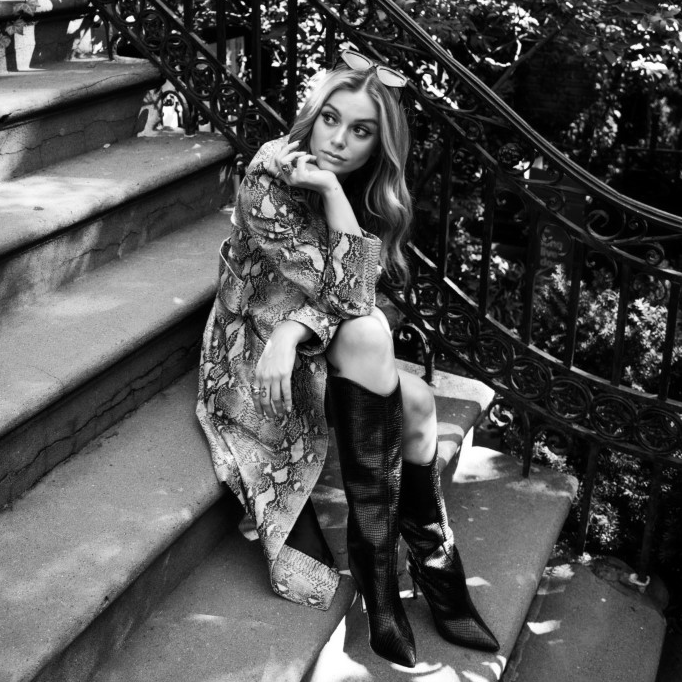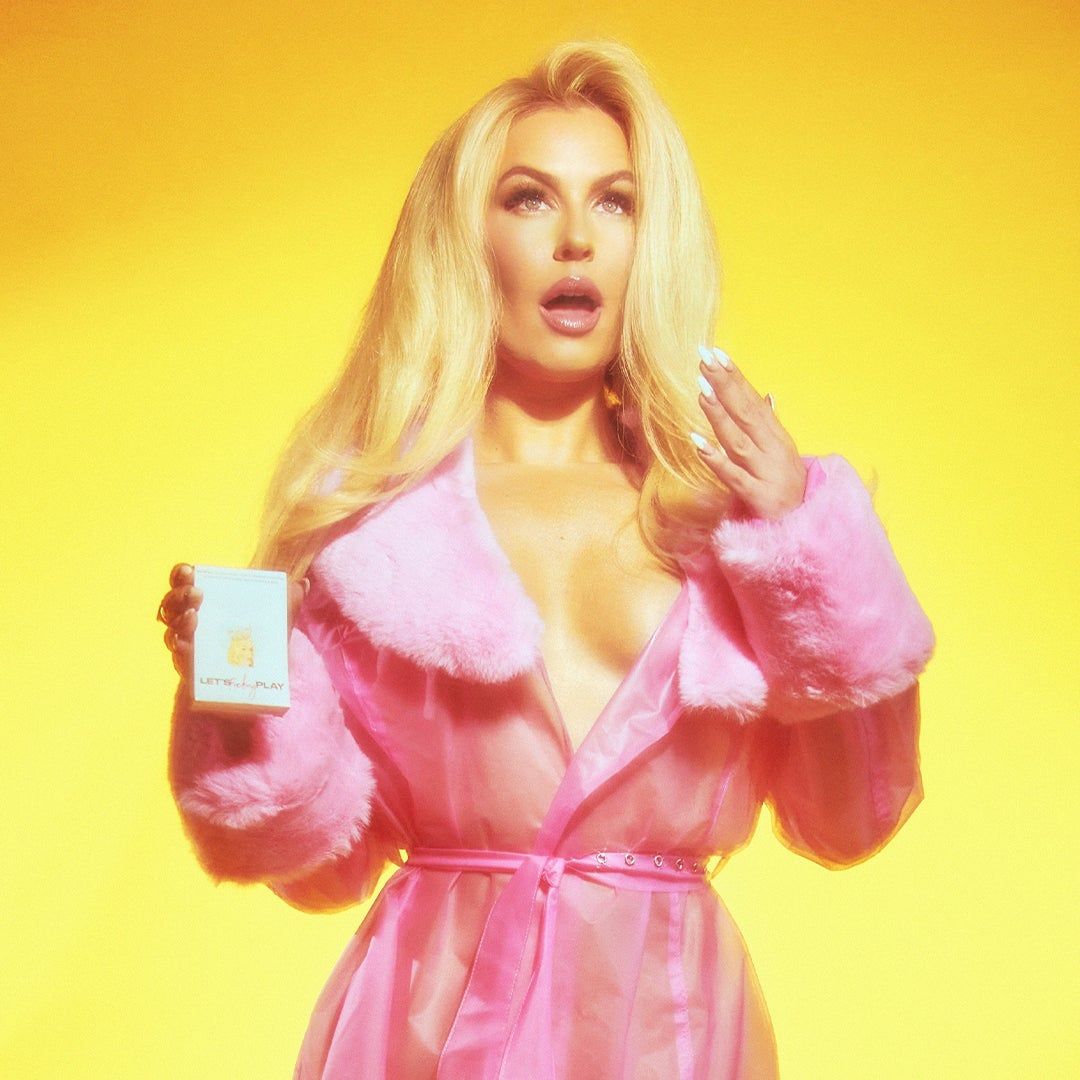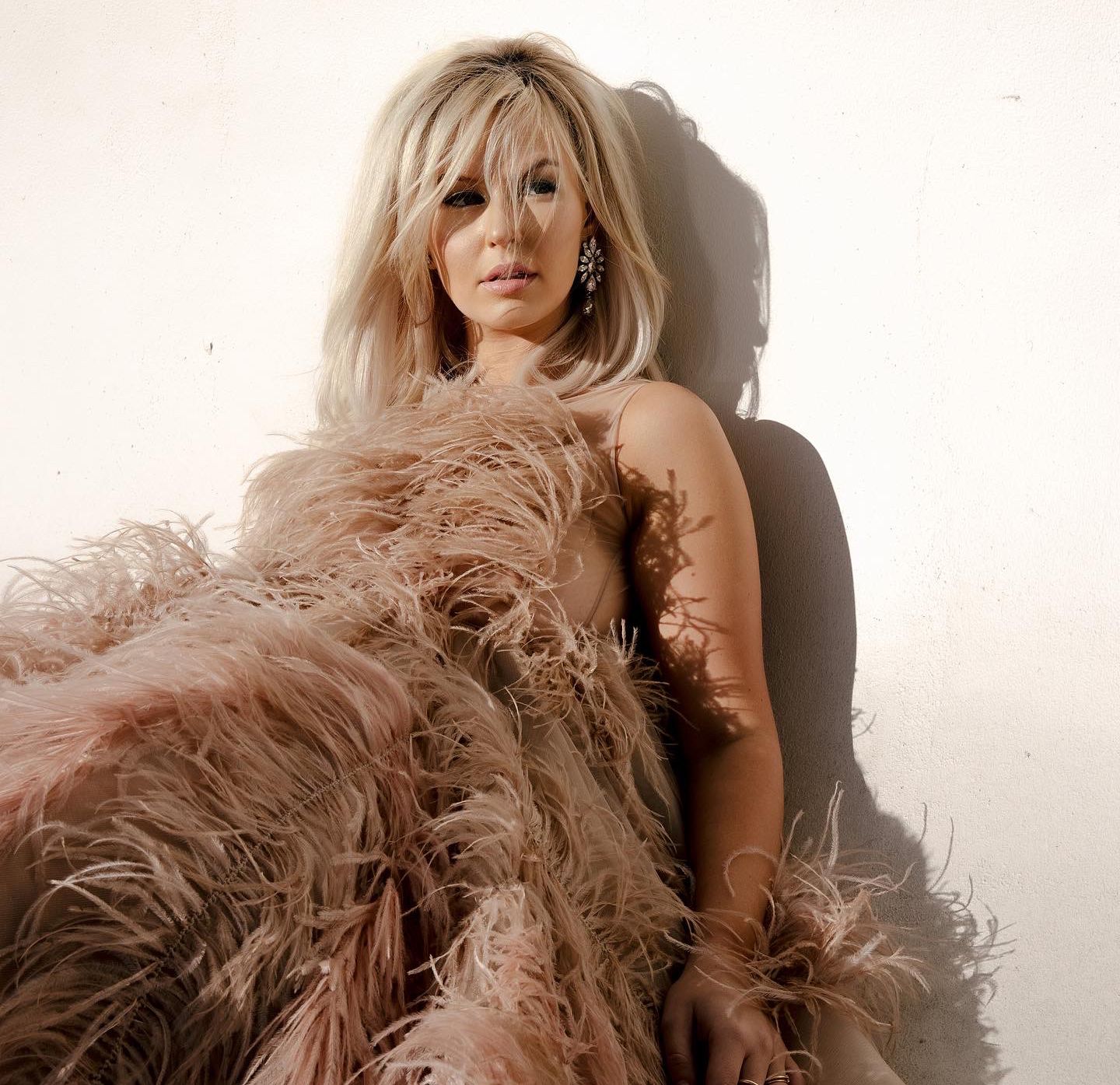The sun is just beginning to set on another Valentine’s Day when Serena Kerrigan, a 27-year-old confidence coach-cum-entrepreneur-cum-certified internet personality, bestows upon me an unusual gift: the diary she began keeping after her first kiss in the fifth grade. In a little over an hour, the lights will go up on her third live show—a two-hour-long storytelling experience where a stilettoed Kerrigan sashays to and fro, spinning yarns about an adolescence punctuated by mean girls and slightly traumatic summer camps and an adulthood punctuated by…well, she’d likely use a less polite term, but I’ll call it a healthy dose of discovery. Sexual, for certain, but of herself in general.
Kerrigan’s brand, otherwise known as SFK—or Serena Fucking Kerrigan, coined after a long-standing joke that she changed her middle name during her freshman year at Duke University because the f-word simply added more panache—is revered by some hundreds of thousands of Gen Z and Millennial women on Instagram and TikTok for its simple approach to improving one’s life, self-esteem, and relationships. Her wisdom isn’t groundbreaking (“you write, produce, direct and star in your life”) nor does it leave room for much nuance (“if it’s not a fuck yes, it’s a fuck no”) but evidence that her message resonates isn’t difficult to find among the throngs of devotees—all leather-clad and claw-clipped—who’ve arrived just as the doors open. I don’t overhear a single person lodging their displeasure over the holiday, only squealing in anticipation and complimenting each other’s takes on Euphoria makeup.
I’m backstage just long enough for the native New York to greet me like an old friend, offering a “You look cute,” before she grabs the diary and starts flipping through its pages.
“My dad bid for this on eBay,” she tells me, lifting it for me to get a better look. It’s made by Juicy Couture and exactly no part of me is shocked, though I’m amused by the thought of how many other moms and dads would’ve bid on a designer diary for their child to doodle about hating their parents. She adjusts her cropped sweatsuit, tucks her legs under herself on the couch, and begins to read a passage.
“I hooked up with Jesse. We both went to second. I didn’t think it was a big deal but just to be safe, I told him not to tell anyone. But those things turned around completely. Everyone knew, the teachers called our parents, and now apparently, I’m a slut? I don’t understand. When a guy hooks up with many girls, he’s called a pimp in a good way. When a girl hooks up with many guys, she’s called a slut in a bad way. Huh? Before I thought hooking up was cool. Now it’s slutty. How did we get here?”
While many of us have likely pondered the same question, posed it to an elder or a friend in frustration, and probably sparred with someone of the opposite sex in a futile attempt to regain control of the narrative, perhaps it’s simpler to instead discuss how Kerrigan got here: curled up in this green room, trying to make sense of a memento saved from a not-so-simpler time, as 200 women who consider her the best friend they’ve never met wait for her to take the stage.
In February 2020, just before the world was plunged into a pandemic, Kerrigan quit her job as a video producer and content creator for Refinery29 to begin building her brand. Her mother, an executive vice president at MTV, and her father, a director and screenwriter, had always advised Kerrigan to maintain agency in her career. After three years at Refinery29, this was the first step, but just one month later, agency became hard to come by: As the pandemic began, thousands across the country were laid off and millions were confined to their homes under the constant threat of illness. Even those who ordinarily don’t crave the social trappings of real life—like going on first dates—found themselves longing for even one forced conversation in a crowded bar.
But Kerrigan, who was quarantining alone in her apartment in the East Village, saw the social stillness as an opportunity, and began going on blind dates and livestreaming them on Instagram. The show “Let’s Fucking Date” was born and became an overnight sensation, due in large part to Kerrigan’s take-no-prisoners wit and off-the-chart levels of self-confidence. The Today Show dubbed the show “Quarantine’s New Must-Watch,” it was honored by the Webby Awards, and drew 1.1 million views by the end of its “first season” alone.
After an influx of DMs from inspired viewers, Kerrigan decided to put her teachings into fans’ hands, creating a card game, also named Let’s Fucking Date, to guide them through everything from resuscitating stale first or second dates to spicing up a long term relationship that’s losing its luster. On each card is a question like “What’s your biggest pet peeve on dates?” or “What’s the last text you sent about me?” And because seemingly everything Kerrigan touches somehow turns to gold, that too was a hit, and spawned two more X-rated iterations of the game, Let’s Fucking Fuck and Let’s Fucking Play, just months after the first release.
The latter deck, designed for self-exploration, was announced via OnlyFans, with a portion of the proceeds being donated to the Sex Workers Outreach Project (SWOP), a grassroots social justice network dedicated to protecting the rights of sex workers.
“With the launch, we really wanted to have a conversation about people owning their body and feeling free to do what they want with it,” Kerrigan told ELLE.com. “If it’s a means to make money, then that’s absolutely their prerogative. When I launched the OnlyFans, it was always just to launch the game and get my audience using the platform. We don’t want to take away from the creators who are actually on it to make a living.”
Though she won’t offer specifics, she teases there’s more to come from the partnership with SWOP in the near future. When I press her about backlash to the publicity push, she said the majority of the more mean reactions came from women.
“There were women like, ‘I thought you wanted to be the face of Chanel and go to the MET Gala,’” she recalls with an eye roll. “If I’m receiving this kind of hate, I can’t imagine the magnitude for, you know, minorities, and people of color that are using this platform as sex workers.”
I wondered aloud if she can truly understands the full ramifications of joining OnlyFans compared with those who can’t, say, quit a stable day job to build their brands. One of Kerrigan’s frequent mantras is, “Do it for the plot,”—her take on YOLO. But at what risk? And with what means?
“I realize that so much of my identity, being known as this queen of confidence and holding this position of power is intrinsically tied to my privilege. I’m fully aware that so much of my success has come from that,” she tells me. “I get messages from all kinds of people across the world all the time telling me they’re afraid—of changing jobs, of moving, of dating, everything. I guess, when I tell people to ‘Do it for the plot,’ I don’t mean, ‘Jump off a bridge and hope for the best.’ I’m saying that everything is a part of your story and the worst thing that can happen is dying without trying at all.”
Many of Kerrigan’s followers often remark how relatable she is, but there’s a strong case to be made that she’s quite the opposite. Her West Village apartment, a pristine sanctuary of varying shades of white—from egg shell to pearl—isn’t exactly representative of how many 20-somethings are living in New York. Nor is her social calendar (she was seated next to Candace Bushnell at a NYFW event), enviable wardrobe, and cadre of conventionally hot and financially comfortable friends. Last fall, paparazzi photos of her palling around with Sports Illustrated models like Nina Agdal and Brooks Nader made the rounds, as did quotes to Us Weekly about Scott Disick and Amelia Hamlin’s breakup.
No, Kerrigan is not relatable; she’s aspirational. And while it would be easy to reduce her to just another product of nepotism with too much time, money, and ego on her hands, I find myself stopping short on multiple occasions. Later in the evening, her publicist shares how deeply upset she was by a recent article that implied she doesn’t pay her staff. That reaction isn’t hard to imagine. She’s surprisingly self-aware, earnest to the point of endearing, and over-the-top eager to please those who’ve shown up tonight. Now that I found relatable.
“Am I doing okay?” she asks no less than three times throughout our time together. Even Serena Fucking Kerrigan has her moments. I ask if she feels nervous as a staffer enters the room and makes adjustments to the temperature in the room where the show will be held.
“I’m sorry I just like, need a minute,” she says, visibly distracted. It’s clear that whatever she’s about to say, she wants to get absolutely right. Her publicist opens a bottle of champagne and when the staffer leaves the room, Kerrigan regains her concentration.
“I feel like if I weren’t nervous then the stakes wouldn’t be high enough. The fact that I am means that I’m doing what I’m supposed to be doing. But I do feel a responsibility to perform. People paid money, they took time out of their day. I want to make them laugh.”
Before I take my seat, I pose a few quick questions taken directly from all three of her card games. The first: “What’s better than an orgasm?”
“The people who tell me I’ve changed their life or the way they view themselves,” she replies. But at the risk of sounding too sentimental, she adds, “Although, I love cumming.”
“There’s nothing better than falling in love on Valentine’s Day. Is anyone falling in love right now?” Kerrigan asks the audience, who hoot and holler in enthusiastic response.
“Really? Because y’all are fucking here…” she deadpans. To no one’s surprise, the room is populated entirely by gaggles of women and their friends, gleefully being overcharged for cocktails with names like “The Lily Collins,” and giggling with their friends. Seated at a table next to me are two recent alums from the Bachelor universe, as is Kerrigan’s mother, Lily Neumeyer, who receives several dedications throughout the show and uproarious applause whenever she’s name-checked. She bashfully hides her face in her hands on each occasion, but especially after her daughter forgets a line and she blurts it from her seat.
The live show felt like Kerrigan’s social media presence come alive, with her recounting dishy sexploits and reflecting on puberty, partying, and schemes gone awry. Kerrigan changed outfits four times during the show—five if you count her meet-and-greet dress—and around the halfway mark, she dons a black lace veil like an old Italian widow for a mock funeral to lay to rest the names of past hookups and relationships. The audience howls mostly male names into the drunken ether as Kerrigan tosses roses into the crowd.
But it’s not all debauchery and dates.
“We are indoctrinated to believe if we’re not soft launching a dude’s elbow, we’re lonely,” she waxes poetic at one point, encouraging her devotees to raise a glass and toast to friendship and the relationship we have with ourselves. I sneak a peek at the women nearest me and note a few collecting stray tears as they clink half-empty glasses and beam at their friends—a display that makes a part of me feel lonely for my own.
Near the end of the show, a full-length mirror is brought onstage, and flashes of recognition register on the faces of those around me. Though the internet is still largely devoid of spoilers, Kerrigan’s fans know what’s next. Talking to herself in a mirror and “hyping herself up” is a cornerstone of her burgeoning brand; she believes it’s a crucial practice for cultivating bulletproof self-esteem. She frequently uses the ritual on social media and even brought it on screen for her stint on the last season of MTV’s “Siesta Key” as she coached cast members through crises.
She asks for volunteers and within seconds, a girl teeters to the stage. Kerrigan, positioned behind her and now wearing an entirely see-through dress, asks her to look at herself in the mirror and tell her reflection what she loves most about herself.
“You’re such a good friend and you do so much for people,” she begins, before Kerrigan interjects. “No, I don’t want to hear what you do for people. I want to hear what you like about yourself,” she chides.
“Well, I like my eyes,” the girl shyly admits. The audience erupts as if she’s just announced she’s just eradicated the coronavirus. A few more lucky participants get their moment and each one is punctuated by the same reaction.
When the show ends, I watch from the side of the stage as the meet-and-greets begin. Kerrigan spends no less than at least five minutes with each person, speaking to them as if she’s catching up with long lost friends. A woman and her best friend flew from Boston that morning to be there for the show, one of which left her boyfriend, confused about why they weren’t spending Valentine’s together, at home. Another young woman, who looks no more than 22, tells Kerrigan she’s changed her life. It’s a sentiment she’s heard a hundred times now—via DM and IRL—but it seems to move Kerrigan so much that she actually begins stroking the woman’s hair before bringing her in for a long hug and parting with a full-throated, “I love you!”
I find myself laughing as a particularly raucous group of six or seven women approach and pose for photos in at least three different formations, all flanking Kerrigan. She’s built a real community here, one that clearly backs her with the same ferocity that she encourages them to feel for themselves.
She notices me watching and reaches out.
“Come on, we’re taking a picture together!” she declares.
I humbly request that the magic mirror be brought on stage and we take at least 50 mirror pics, gazing at our own reflections. As per usual, she smolders as I try to hold my own. I appraise myself, noticing that my hair has fallen and my makeup is less than fresh. We swipe through the pictures together and she remarks that we’re “so hot.” I suddenly realize she’s giving me the same treatment as the others, though I never volunteered.
Just as I return home, I receive a text from Kerrigan. Earlier that night I’d asked if any male celebrities were in her DMs and she told me she’d think about it and get back to me. Hours later, she lands on an all-too-on-brand response:
‘None so far but I have a feeling that is going to change very soon 😉 LOL”
After all, she doesn’t call herself the “Queen of Confidence” for nothing.

Audra Heinrichs is a freelance feature writer and reporter, covering social justice, politics and cultural moments and movements. Her work has appeared in The Washington Post, Rolling Stone, The Guardian, Teen Vogue, Harper’s Bazaar, and many more.










